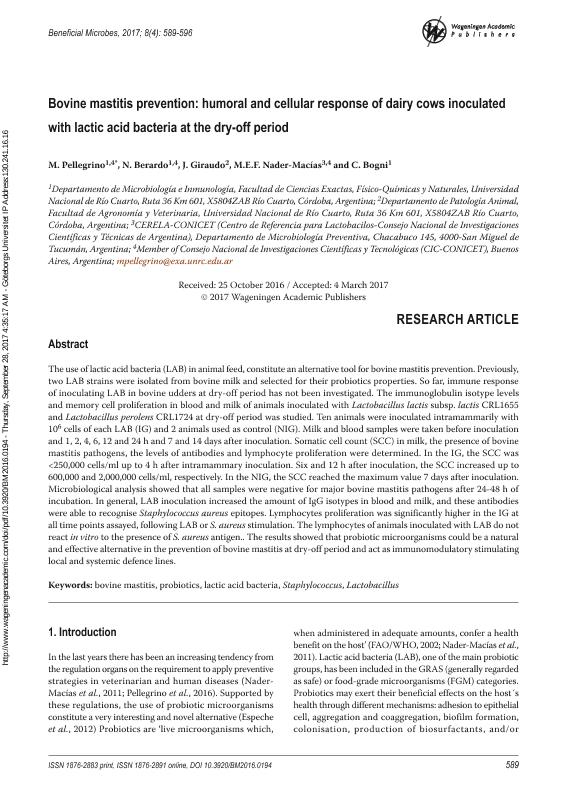Mostrar el registro sencillo del ítem
dc.contributor.author
Pellegrino, Matias Santiago

dc.contributor.author
Berardo, Natanael

dc.contributor.author
Giraudo, Jose Angel

dc.contributor.author
Nader, Maria Elena Fatima

dc.contributor.author
Bogni, Cristina Ines

dc.date.available
2019-08-30T18:40:12Z
dc.date.issued
2017-07-13
dc.identifier.citation
Pellegrino, Matias Santiago; Berardo, Natanael; Giraudo, Jose Angel; Nader, Maria Elena Fatima; Bogni, Cristina Ines; Bovine mastitis prevention: Humoral and cellular response of dairy cows inoculated with lactic acid bacteria at the dry-off period; Wageningen Academic Publishers; Beneficial Microbes; 8; 4; 13-7-2017; 589-596
dc.identifier.issn
1876-2883
dc.identifier.uri
http://hdl.handle.net/11336/82632
dc.description.abstract
The use of lactic acid bacteria (LAB) in animal feed, constitute an alternative tool for bovine mastitis prevention. Previously, two LAB strains were isolated from bovine milk and selected for their probiotics properties. So far, immune response of inoculating LAB in bovine udders at dry-off period has not been investigated. The immunoglobulin isotype levels and memory cell proliferation in blood and milk of animals inoculated with Lactobacillus lactis subsp. lactis CRL1655 and Lactobacillus perolens CRL1724 at dry-off period was studied. Ten animals were inoculated intramammarily with 106 cells of each LAB (IG) and 2 animals used as control (NIG). Milk and blood samples were taken before inoculation and 1, 2, 4, 6, 12 and 24 h and 7 and 14 days after inoculation. Somatic cell count (SCC) in milk, the presence of bovine mastitis pathogens, the levels of antibodies and lymphocyte proliferation were determined. In the IG, the SCC was < 250,000 cells/ml up to 4 h after intramammary inoculation. Six and 12 h after inoculation, the SCC increased up to 600,000 and 2,000,000 cells/ml, respectively. In the NIG, the SCC reached the maximum value 7 days after inoculation. Microbiological analysis showed that all samples were negative for major bovine mastitis pathogens after 24-48 h of incubation. In general, LAB inoculation increased the amount of IgG isotypes in blood and milk, and these antibodies were able to recognise Staphylococcus aureus epitopes. Lymphocytes proliferation was significantly higher in the IG at all time points assayed, following LAB or S. aureus stimulation. The lymphocytes of animals inoculated with LAB do not react in vitro to the presence of S. aureus antigen.. The results showed that probiotic microorganisms could be a natural and effective alternative in the prevention of bovine mastitis at dry-off period and act as immunomodulatory stimulating local and systemic defence lines.
dc.format
application/pdf
dc.language.iso
eng
dc.publisher
Wageningen Academic Publishers
dc.rights
info:eu-repo/semantics/openAccess
dc.rights.uri
https://creativecommons.org/licenses/by-nc-sa/2.5/ar/
dc.subject
Bovine Mastitis
dc.subject
Lactic Acid Bacteria
dc.subject
Lactobacillus
dc.subject
Probiotics
dc.subject
Staphylococcus
dc.subject.classification
Otras Ciencias Veterinarias

dc.subject.classification
Ciencias Veterinarias

dc.subject.classification
CIENCIAS AGRÍCOLAS

dc.title
Bovine mastitis prevention: Humoral and cellular response of dairy cows inoculated with lactic acid bacteria at the dry-off period
dc.type
info:eu-repo/semantics/article
dc.type
info:ar-repo/semantics/artículo
dc.type
info:eu-repo/semantics/publishedVersion
dc.date.updated
2019-08-20T14:14:17Z
dc.identifier.eissn
1876-2891
dc.journal.volume
8
dc.journal.number
4
dc.journal.pagination
589-596
dc.journal.pais
Países Bajos

dc.journal.ciudad
Wageningen
dc.description.fil
Fil: Pellegrino, Matias Santiago. Universidad Nacional de Río Cuarto; Argentina
dc.description.fil
Fil: Berardo, Natanael. Universidad Nacional de Río Cuarto; Argentina. Consejo Nacional de Investigaciones Científicas y Técnicas; Argentina
dc.description.fil
Fil: Giraudo, Jose Angel. Universidad Nacional de Río Cuarto; Argentina
dc.description.fil
Fil: Nader, Maria Elena Fatima. Consejo Nacional de Investigaciones Científicas y Técnicas. Centro Científico Tecnológico Conicet - Tucumán. Centro de Referencia para Lactobacilos; Argentina
dc.description.fil
Fil: Bogni, Cristina Ines. Universidad Nacional de Río Cuarto; Argentina
dc.journal.title
Beneficial Microbes
dc.relation.alternativeid
info:eu-repo/semantics/altIdentifier/doi/httpS://dx.doi.org/10.3920/BM2016.0194
dc.relation.alternativeid
info:eu-repo/semantics/altIdentifier/url/https://www.wageningenacademic.com/doi/10.3920/BM2016.0194
Archivos asociados
